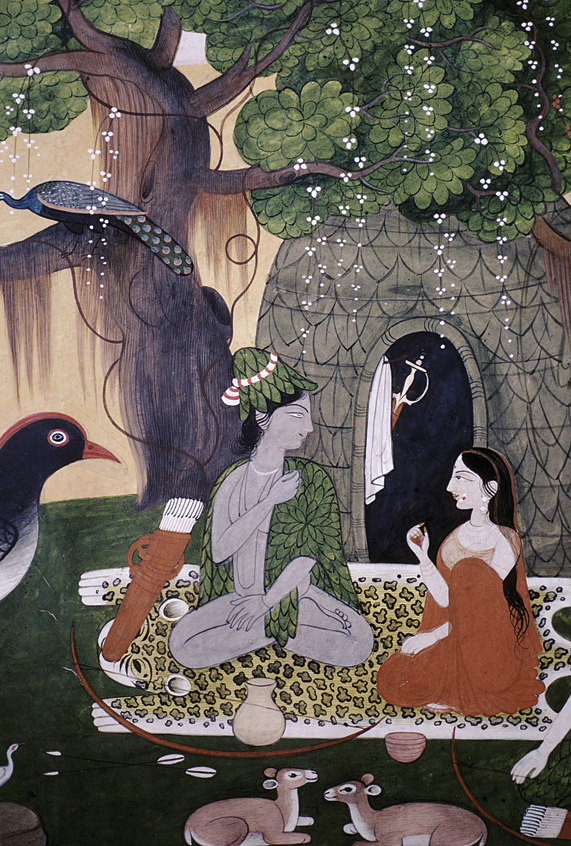A History of World Societies:
Printed Page 72
Listening to the Past
Conversations Between Rama and Sita from the Ramayana
Listening to the Past
Conversations Between Rama and Sita from the Ramayana
The Ramayana, an epic poem of about fifty thousand verses, is attributed to the third-
The passage below gives the conversations between Rama and Sita after Rama learns he must leave. In subsequent parts of the very long epic, the lovers undergo many other tribulations, including Sita’s abduction by the lord of the demons, the ten-
The Ramayana eventually appeared in numerous versions in all the major languages of India. Hearing it recited was said to bring religious merit. Sita, passionate in her devotion to her husband, has remained the favorite Indian heroine. Rama, Sita, and the monkey Hanuman are cult figures in Hinduism, with temples devoted to their worship.

““For fourteen years I must live in Dandaka, while my father will appoint Bharata prince regent. I have come to see you before I leave for the desolate forest. You are never to boast of me in the presence of Bharata. Men in power cannot bear to hear others praised, and so you must never boast of my virtues in front of Bharata. . . . When I have gone to the forest where sages make their home, my precious, blameless wife, you must earnestly undertake vows and fasts. You must rise early and worship the gods according to custom and then pay homage to my father Dasaratha, lord of men. And my aged mother Kausalya, who is tormented by misery, deserves your respect as well, for she has subordinated all to righteousness. The rest of my mothers, too, must always receive your homage. . . . My beloved, I am going to the great forest, and you must stay here. You must do as I tell you, my lovely, and not give offense to anyone.”
So Rama spoke, and Sita, who always spoke kindly to her husband and deserved kindness from him, grew angry just because she loved him, and said, “My lord, a man’s father, his mother, brother, son, or daughter-
“If I were to be offered a place to live in heaven itself, Rama, tiger among men, I would refuse it if you were not there. I will go to the trackless forest teeming with deer, monkeys, and elephants, and live there as in my father’s house, clinging to your feet alone, in strict self-
When Sita finished speaking, the righteous prince, who knew what was right and cherished it, attempted to dissuade her. . . .
“Sita, give up this notion of living in the forest. The name ‘forest’ is given only to wild regions where hardships abound. . . . There are lions that live in mountain caves; their roars are redoubled by mountain torrents and are a painful thing to hear — the forest is a place of pain. At night worn with fatigue, one must sleep upon the ground on a bed of leaves, broken off of themselves — the forest is a place of utter pain. And one has to fast, Sita, to the limit of one’s endurance, wear clothes of barkcloth and bear the burden of matted hair. . . . There are many creeping creatures, of every size and shape, my lovely, ranging aggressively over the ground. . . . Moths, scorpions, worms, gnats, and flies continually harass one, my frail Sita — the forest is wholly a place of pain. . . .”
Sita was overcome with sorrow when she heard what Rama said. With tears trickling down her face, she answered him in a faint voice. . . . “If from feelings of love I follow you, my pure-
Though she pleaded with him in this and every other way to be allowed to go, great-
Finding that her husband had acquiesced in her going, the lady was elated and set out at once to make the donations.”
Source: The Ramayana of Valmiki: An Epic of India. Vol. 2: Ayodhyakanda, trans. Sheldon I. Pollock, ed. Robert P. Goldman (Princeton, N.J.: Princeton University Press, 1986), pp. 134–
QUESTIONS FOR ANALYSIS
- What can you infer about early Indian family life and social relations from this story?
- What do Sita’s words and actions indicate about women’s roles in Indian society of the time?
- What do you think accounts for the continuing popularity of the story of Rama throughout Indian history?